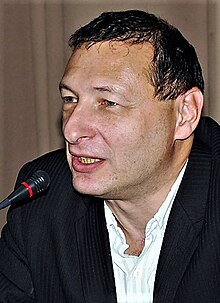Boris Kagarlitsky: Difference between revisions
MicNickBell (talk | contribs) |
MicNickBell (talk | contribs) |
||
| Line 111: | Line 111: | ||
[[Category:Russian atheists]] |
[[Category:Russian atheists]] |
||
[[Category:Russian political scientists]] |
[[Category:Russian political scientists]] |
||
[[Category:Russian Academy of Theatre Arts alumni]] |
|||
[[Category:People listed in Russia as media foreign agents]] |
[[Category:People listed in Russia as media foreign agents]] |
||
Revision as of 16:06, 7 May 2022
This article includes a list of references, related reading, or external links, but its sources remain unclear because it lacks inline citations. (February 2013) |
Boris Yulyevich Kagarlitsky | |
|---|---|
 Kagarlitsky in 2011 | |
| Born | 29 August 1958 |
| Era | Contemporary philosophy |
| Region | Western philosophy Russian philosophy |
| School | Marxism[1] World-systems theory[2] |
Main interests | Philosophy, sociology, labour, history, class struggle |
Boris Yulyevich Kagarlitsky (Template:Lang-ru; born 29 August 1958) is a Russian Marxist theoretician and sociologist who has been a political dissident in the Soviet Union and in post-Soviet Russia. He is coordinator of the Transnational Institute Global Crisis project and Director of the Institute of Globalization and Social Movements (IGSO) in Moscow.
Political activities
In the 1970s, he studied theatre criticism at the State Institute of Theatrical Art (GITIS), before being expelled for dissident activities in 1980. His editorship of the samizdat journal Levy Povorot (Left Turn) from 1978 to 1982, and contributions to the samizdat journal Varianty (Variants) during the same period, led to his arrest for 'anti-Soviet' activities in 1982. He was pardoned and released in 1983.
In 1988 he published his book, The Thinking Reed: Intellectuals and the Soviet State From 1917 to the Present, which won the Deutscher Memorial Prize .
In 1988, after the rise of Mikhail Gorbachev and perestroika, he was permitted to resume his studies at the GITIS, graduating in the same year, and became coordinator of the Moscow People's Front. In 1990, he was elected to the Moscow City Soviet and to the Executive of the Socialist Party of Russia. He co-founded the Party of Labour in October 1992. In October 1993, the former Soviet dissident was arrested, with two other members of his party, for his opposition to President Boris Yeltsin during the September—October constitutional crisis, but was released the next day after international protests. Later that year, his job and the Moscow City Soviet were abolished under Yeltsin's new constitution. The events and his experiences during this momentous period are documented in his book, Square Wheels: How Russian Democracy Got Derailed.
Kagarlitsky is the director of Institute of Globalisation Studies and Social Movements (IGSO)[3] and editor in chief of Levaya Politika (Left Politics) quarterly in Moscow.
Academic career
From 1994 to 2002, he was a senior research fellow at the Institute for Comparative Political Studies of the Russian Academy of Sciences (ISPRAN). He was awarded his Doctorate degree for his thesis, Collective Actions and Labour Policies in Russia in the 90s, in 1995, and has taught political science at Moscow State University, the Moscow School for Social and Economic Sciences, and the Institute of Sociology of the Russian Academy of Sciences.
Books
- The Thinking Reed: Intellectuals and the Soviet State from 1917 to the Present (1988)
- The Dialectic of Change (1989)
- Farewell Perestroika: A Soviet Chronicle (1990)
- Disintegration of the Monolith (1993)
- Square Wheels: How Russian Democracy Got Derailed (1994)
- The Mirage of Modernization (1995)
- Restoration in Russia (1995)
- Globalization and Its Discontents: The Rise of Postmodern Socialisms (1996, with Roger Burbach and Orlando Nuñez)
- New Realism, New Barbarism: Socialist Theory in the Era of Globalization (1999)
- The Twilight of Globalization: Property, State and Capitalism (1999)
- The Return of Radicalism: Reshaping the Left Institutions (2000)
- Russia under Yeltsin and Putin: Neo-liberal Autocracy (2002)
- The Politics of Empire: Globalisation in Crisis (2004, co-edited by Alan Freeman)
- The Revolt of the Middle Class (2006)
- Empire of the Periphery: Russia and the World System (2008)
- Back in the USSR (2009)
References
- ^ "Who is Boris Kagarlitsky?". www.kagarlitsky.narod.ru.
- ^ "Empire of the periphery". 12 September 2008.
- ^ Institute of Globalisation Studies and Social Movements
External links
Biographical
- Official website
- Unofficial website
- Boris Kagarlitsky's IGSO profile
- Boris Kagarlitsky's profile on the Transnational Institute, with columns, articles, interviews, etc.
Articles
- Boris Kagarlitsky's ZSpace Page
- Boris Kagarlitsky at Eurasian Home
- Boris Kagarlitsky at Rabkor
- Boris Kagarlitsky at Scepsis
Interviews
- New period for Russia, Weekly Worker, March 16, 2006
- Class-consciousness and the naked king, Weekly Worker, May 10, 2007
- TV interview on the night of the 2008 Russian presidential election, Russia Today, March 2, 2008
Papers and essays
- Facing the Crisis, Paper presented at the Global Crisis Seminar, TNI, Amsterdam, 17–18 February 2002
- A Black Cat in a Dark Room, TNI Website, 27 October 2004
- Russia 1917 and the global revolution, Weekly Worker, October 26, 2006
- Fuse workers’ movement and Marxism, Weekly Worker, November 9, 2006
Video
- 1958 births
- Living people
- People from Moscow
- Marxist theorists
- Russian Marxist historians
- Labor historians
- Russian sociologists
- Russian politicians
- Russian political writers
- Russian journalists
- Russian Marxists
- Russian political activists
- Russian socialists
- Russian communists
- Russian dissidents
- Soviet dissidents
- Libertarian socialists
- Russian atheists
- Russian political scientists
- Russian Academy of Theatre Arts alumni
- People listed in Russia as media foreign agents
